16 best hip hop video games of all time
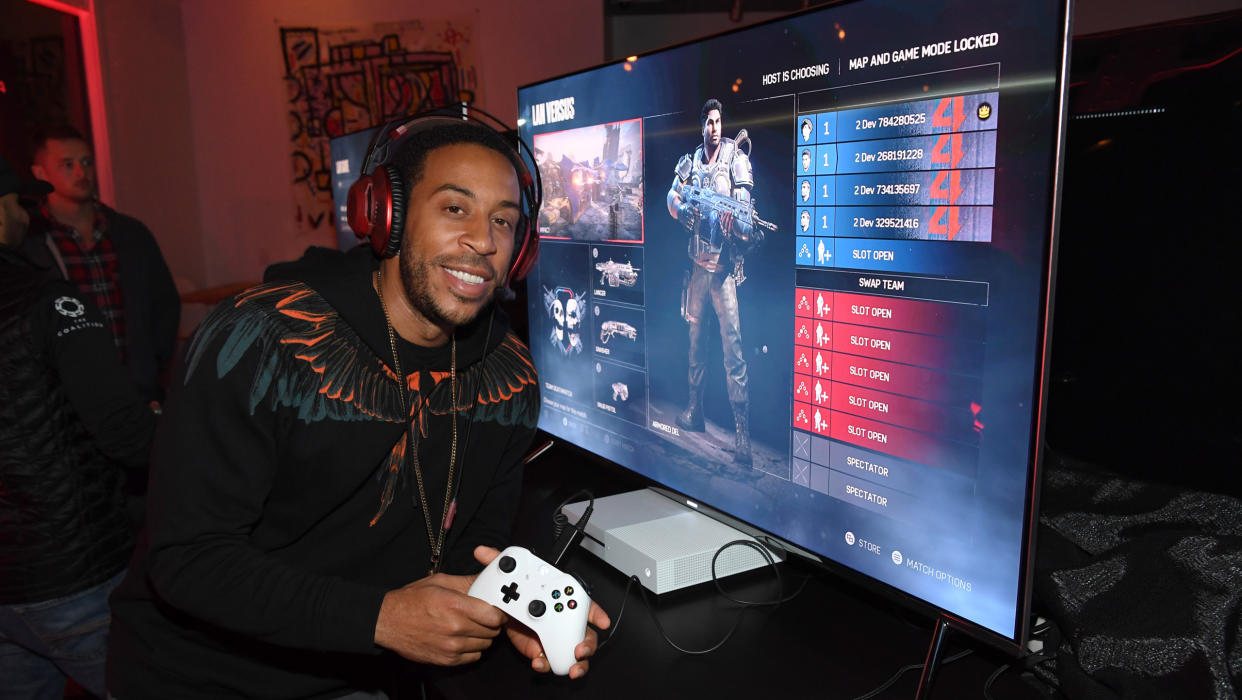
- Oops!Something went wrong.Please try again later.
- Oops!Something went wrong.Please try again later.
Since its beginnings in the 1970s, hip hop’s influence has stretched far beyond the confines of music, spilling into gaming decades later. The industry witnessed an emergence of games in the early ’90s and 2000s that not only featured the genre on their soundtracks but were also centered around the culture itself. Titles such as Def Jam: Fight for NY and 50 Cent: Bulletproof showed the reciprocal relationship between the two communities and offered an immersive experience into rap’s gritty aesthetic and storytelling.
The synergy between hip hop and video games has only grown stronger in the years since, solidifying the genre’s place within the virtual world. With such debuts as Wu-Tang: Shaolin Style and the NBA 2K franchise, players no longer had to consume music passively. Fans were able to step into the shoes of their favorite artists, whether it be in fighting-style, sports or music-based games. During the early 2000s, hip hop’s cultural sway became a force in defining gaming narratives, characters and the overall experience.
Now, hip hop and gaming stand together as heavyweights in pop culture, with the latter often acting as a vessel for the former’s creative expression. Releases like Grand Theft Auto: San Andreas breathed new life into rap’s history and ethos, while DJ Hero and B-Boy probed subcultures within the genre.
REVOLT rounded up 16 iconic games that brought the two industries together in a major way. Check those out below.
1. Def Jam: Vendetta
Released in 2003, Def Jam Vendetta was a celebrated merger between hip hop and gaming. It brought the namesake record label’s roster into a virtual wrestling ring with artists such as DMX, Ludacris and Method Man taking on roles as fighters. Pulling cues from similar console releases like WWF No Mercy and Virtual Pro Wrestling, it boasted a robust grappling and brawl system, which was a novelty for titles at the time.
Another significant addition to the game’s appeal was its extensive storyline, which allowed the user to pick between four signature fighters. In addition to the instantly recognizable beats featured on the soundtrack, which included records like DMX’s “Party Up (Up in Here)” and Public Enemy’s “Fight the Power,” players got to fight notable rappers such as Scarface, N.O.R.E. and more.
2. 50 Cent: Bulletproof
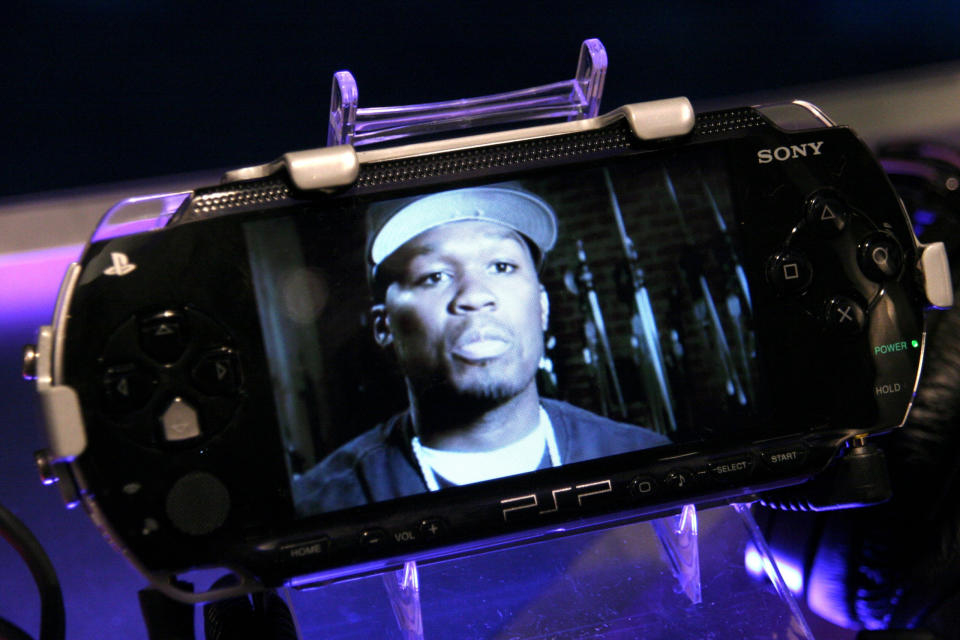
50 Cent: Bulletproof came out in 2005 and gave players a third-person shooter that saw the titular artist seeking revenge on hitmen who attempted to murder him. Voiced by the South Jamaica musician himself, the game also saw cameos from G-Unit members Lloyd Banks, Young Buck and Tony Yayo who came to Fif’s aid.
Eminem and Dr. Dre also made notable appearances with the latter providing medical aid and Slim Shady playing a corrupt officer. The game not only proved to be a new vessel for 50 Cent’s music but also featured 13 never-before-heard songs on Bulletproof. With over six hours of playtime for its main story, this title is arguably one of the most iconic releases named after a rapper.
3. Wu-Tang: Shaolin Style
Wu-Tang: Shaolin Style brought the Staten Island collective to PlayStation in 1999. The game was notable for its lineup of playable characters, including RZA, GZA and Method Man, each of whom was outfitted with their own unique fighting style.
A lesser-known fact is that the release originated from a canceled project titled Thrill Kill, which was later repurposed to fit Wu-Tang Clan’s branding. The group’s input was integral to the development process as well with the final product featuring an exclusive collection of tracks.
“When Wu-Tang came out, it was a much better game than Thrill Kill,” character artist Dana De Lalla told Variety in 2019. “It might as well have been Thrill Kill 2, which we were already planning when the [original] game got canned.”
4. Grand Theft Auto: San Andreas
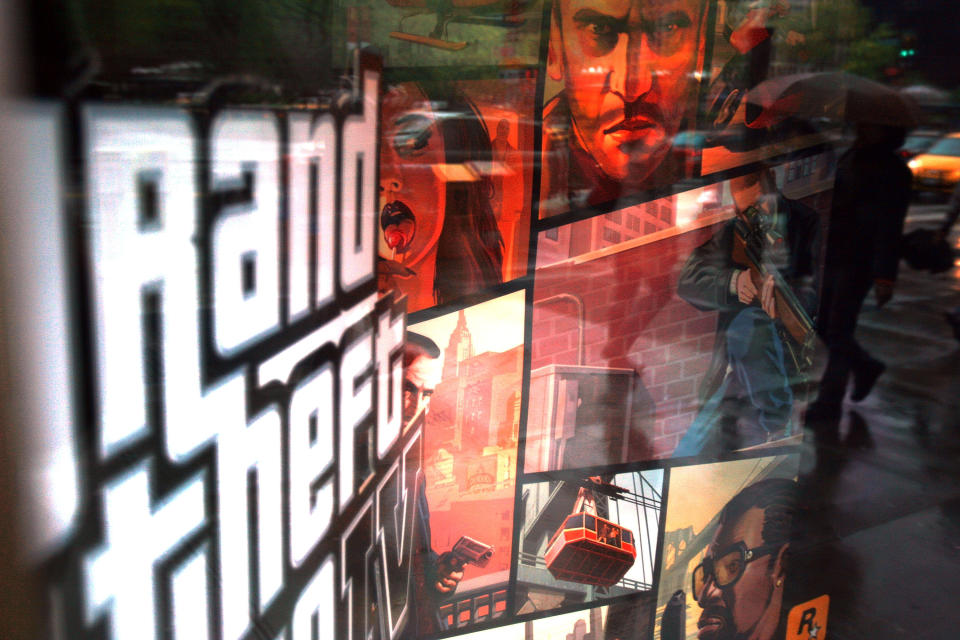
While the entire franchise is intertwined with music, Grand Theft Auto: San Andreas took things into the heart of early ’90s West Coast hip hop culture upon its debut. With an in-game radio station hosted by fictional DJ Julio G, it featured a plethora of tracks from Tupac Shakur, Dr. Dre and Ice Cube that immersed players in the era’s sounds.
Radio Los Santos captured the rise of gangsta rap and delivered nostalgia for hip hop’s golden hour with Chuck D’s character on Playback FM. Meanwhile, MC Eiht lent his voice to Ryder, which also lent credibility to the game’s narrative.
More recently, GTA’s impact on hip hop can be witnessed through rappers livestreaming on platforms like Twitch. Soulja Boy, Chief Keef and Tee Grizzley are among the notable names to host Grand Theft Auto roleplaying servers with Grizzley reportedly making around $200,000 a month from it in 2022.
5. DJ Hero
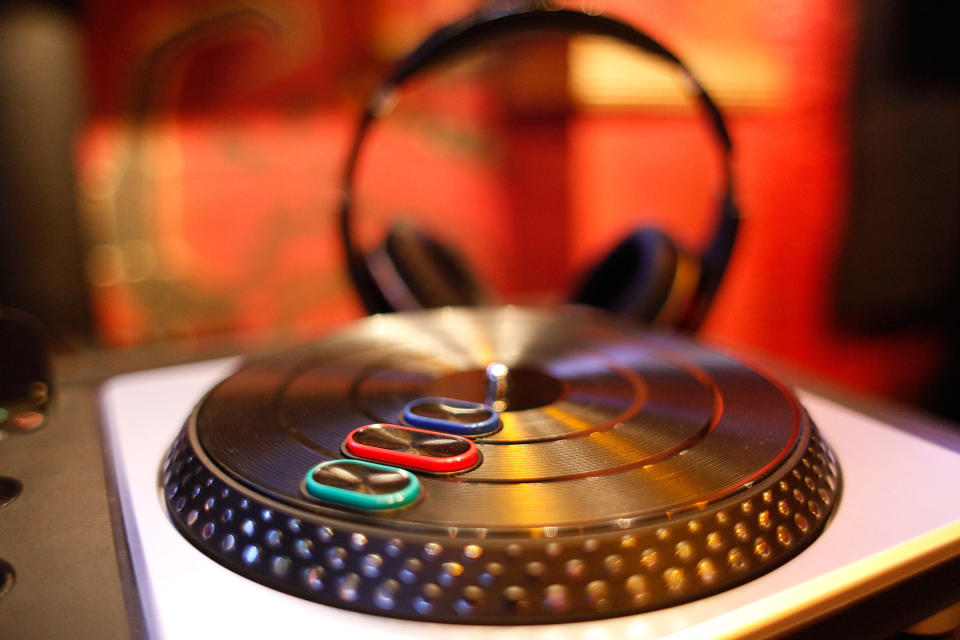
DJ Hero hit the market in 2009 and offered a different type of interaction with hip hop culture. The game featured a controller modeled after a turntable, challenging players to match beats and scratches to hit songs.
With mixes created by legends like Grandmaster Flash and DJ Jazzy Jeff, the title introduced fans to the technical skill behind the music. It showcased the craftsmanship of disc jockeys who ultimately helped shape the sound of hip hop. And JAY-Z’s “Change Clothes,” Shakur’s “All Eyez On Me” and Kid Cudi’s “Day ‘n’ Nite” were just a few of the standout cuts featured in the gameplay.
6. Def Jam: Fight for NY
Def Jam: Fight for NY served as a sequel to the record company’s Vendetta title, released years prior. It featured a robust lineup of nearly 70 characters, including playable appearances from Busta Rhymes, Lil’ Kim, Fat Joe, Snoop Dogg and Carmen Electra.
Much like its predecessor, the game stood out for its deep combat mechanics and extensive soundtrack, punctuated by tracks from the artists involved. However, what was unique about this game was the Blazin’ Move feature, which allowed players to finish fights with signature moves personalized for each artist. There was also the option to customize your character with tattoos and jewelry, and it featured Jacob the Jeweler as a merchant.
7. Rap Jam: Volume One
Rap Jam: Volume One launched in 1995 for the Super Nintendo Entertainment System (SNES). Drawing inspiration from 1993’s NBA Jam, it cast hip hop artists as basketball players in a streetball setting. Featuring rappers like Naughty by Nature, Queen Latifah, Yo-Yo and Public Enemy, the game’s roster was ambitious for its time.
While it didn’t offer the music tracks of the featured artists, it was undoubtedly one of the first games to recognize hip hop personalities as playable characters. Despite its name, the series didn’t receive a second volume, likely due to the developer going defunct a year after its release.
8. Get On Da Mic
Get On Da Mic offered a karaoke-style experience focused solely on rap. The game featured a tracklist spanning three decades of hip hop, from Run-DMC to Snoop Dogg. Much like DJ Hero, it ditched the typical game controller for something more fitting. In this case, it was a handheld microphone that was able to detect the pitch of the user’s voice.
Setting the stage for similar titles like Def Jam: Rapstar and Rock Band, it also challenged players to perform and master the flows of various rap styles. Get On Da Mic represented a shift in music games, spotlighting hip hop’s lyrical art rather than the lyricists themselves.
9. Def Jam: Rapstar
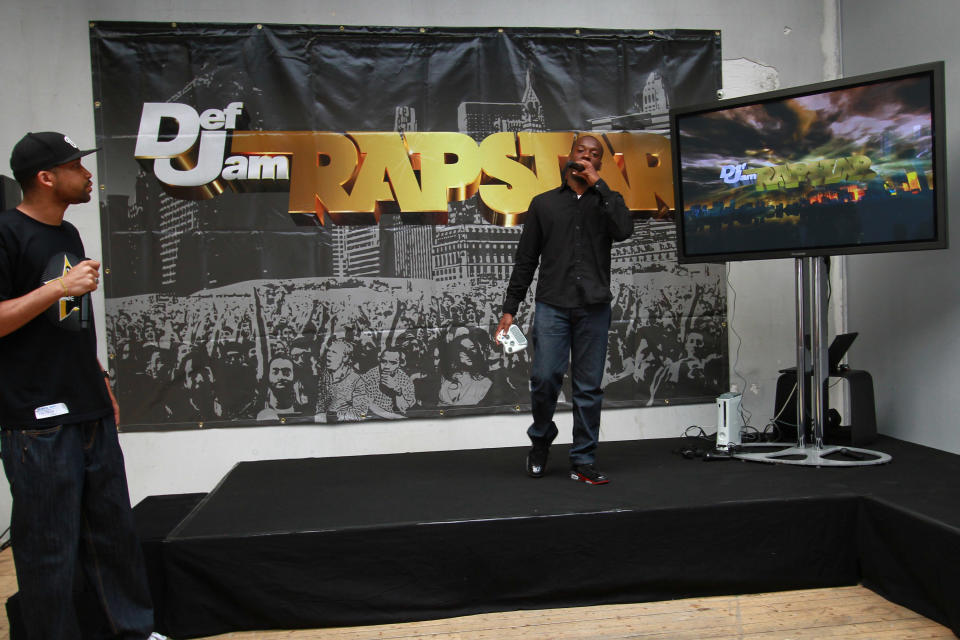
Def Jam: Rapstar debuted in 2010 and brought rap battles and performance into the comfort of players’ living rooms. It was another performance-based game that capitalized on the era’s love for social media and video sharing, allowing players to record and share their renditions of hit records.
It contained roughly 50 songs, including everything from classics like Diddy’s “It’s All About the Benjamins (Remix)” and Big Pun’s “Still Not a Player” to fresher cuts such as Drake’s “Best I Ever Had.” One of the few common criticisms of this game was that it used radio edits of the songs, which led to featured tracks like Lil Wayne’s “A Milli” or 50 Cent’s “I Get Money” being heavily censored.
“Out of all the music games, it was really important that hip hop had its own dedicated game,” Rockstar Games co-founder Jamie King explained to GamesIndustry in 2012. “We had really big ambitions with that website, and it was probably a bit ahead of its time.
10. Call of Duty
Throughout the Call of Duty franchise, hip hop’s influence is felt not just in the musical backdrop but also in the celebrity involvement within the game’s universe. Eminem notably contributed the song “Survival” to Call of Duty: Ghosts. Also, Call of Duty: Black Ops featured voice work by Ice Cube, who made frequent cameos in the campaign as Joseph Bowman.
In 2021, Call of Duty: Warzone dropped a star-studded ad featuring Gunna, Young Thug, Jack Harlow, Saweetie and Swae Lee. Game developer Activision repeated the move again on a smaller scale in a Modern Warfare II trailer that starred Lil Baby and Nicki Minaj.
More recently, Warzone introduced Minaj, Snoop Dogg and 21 Savage as playable characters with their own custom gun skins and call-outs. Ahead of Modern Warfare 3’s Nov. 10 release date, 21 Savage dropped “Call Me Revenge” as a promotional single and also made a brief cameo in the game’s multiplayer trailer.
11. Shaq Fu
Shaq Fu was released in 1994 and stars Shaquille O’Neal. Although technically known for his tenure as an NBA player, he also crossed over into hip hop with a rap album the year prior. The game capitalized on O’Neal’s off-court rap persona and the success of Shaq Diesel, which was RIAA-certified platinum and landed at No. 25 on the Billboard 200 chart.
In the game’s main story, O’Neal stumbled into a dojo en route to a Tokyo charity basketball event, which eventually led to an otherworldly quest. Guided by martial arts master Leotsu, he later embarked on a mission to save a young boy named Nezu from the mummy antagonist, Sett Ra.
This particular title highlighted the early ’90s trend of athletes entering the entertainment industry. Notably, it got a sequel in 2018 called Shaq Fu: A Legend Reborn with Barack Obama and Kanye West making cameos in the downloadable content.
12. NBA 2K
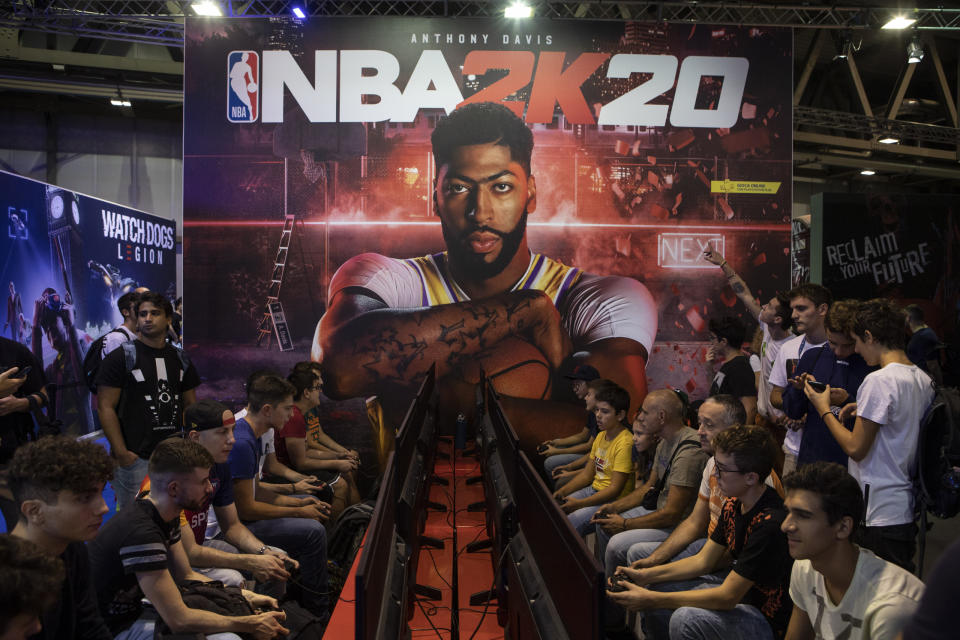
With its inception in 1999, the NBA 2K franchise quickly established itself as one of the most recognizable basketball video games with a cover featuring Allen Iverson during his tenure with the Philadelphia 76ers. Whether it be via the backdrop or making cameos in cutscenes, the series has consistently integrated hip hop into its gaming experience.
Rap icons such as JAY-Z, Pharrell and Travis Scott have been tapped to executive produce the game’s soundtracks, thus injecting authenticity into its musical selections. The franchise also expanded its love for the genre by transforming artists like Lil Durk, Lil Wayne, Jack Harlow and Quavo into playable characters. In 2022, J. Cole graced the game’s cover, becoming the first rapper to achieve the milestone.
During a September interview with Billboard, 2K Games Director of Partnerships and Licensing David Kelley explained, “NBA 2K has become an influential platform where basketball and hip hop culture intersect, creating a place where fans can enjoy the best of both worlds … We want to both honor the culture that came before but also push that musical culture towards what’s next and upcoming, just like how NBA basketball has always done the same for hip hop.”
13. B-Boy
Much like the name suggests, B-Boy offered players an immersive breakdancing experience, allowing them to battle as real-life breakers like Crazy Legs and Rock Steady Crew. The PlayStation 2 game’s soundtrack featured Eric B. & Rakim’s “Don’t Sweat the Technique,” Tha Alkaholiks’ “Make Room” and Biz Markie’s “Something for the Radio,” among others. It also featured the option to customize your outfit and pick between 21 venues, such as the Red Bull BC One, the U.K. B-Boy Championships and IBE.
14. Marc Ecko’s Getting Up: Contents Under Pressure
Initially released in 2006, Marc Ecko’s Getting Up: Contents Under Pressure took a look into the graffiti subculture and its relationship with hip hop. Featuring voice work from heavyweights like Talib Kweli and RZA, the game was centered around a graffiti artist fighting against a corrupt city’s oppression. Other vocal cameos included Diddy, who played Dip, as well as Charlie Murphy, Rosario Dawson and Adam West.
“[Talib Kweli] is the perfect voice for Trane in so many ways. Many of Trane’s personality traits were based and cast around Kwa. Trane is a rebellious intellect. He is young with an old soul. His sarcasm is razor-sharp,” Ecko told Gamespot in 2022.
15. NBA Street
Launched in 2001, NBA Street combined street basketball with hip hop style. It boasted a number of playable personalities, including Michael Jordan, Nelly and Kobe Bryant, and several fictional characters to choose from. The typical three-on-three play style was complemented by soundtracks featuring artists like Xzibit, Nate Dogg, MC Lyte and more.
The series, especially NBA Street Vol. 2, rose to acclaim for capturing the essence of street basketball and its soundtrack. Notably, Nelly contributed an exclusive song titled “Not in My House,” which boasted production from Just Blaze.
16. PaRappa the Rapper
PaRappa the Rapper was a rhythm-based video game that was released for PlayStation in 1996. It featured a two-dimensional character, PaRappa, who navigated a series of challenges to impress his love interest. As one of the original titles in the genre, it offered an innovative interactive experience with players performing in simulated rap battles by timing their button presses to on-screen cues.
The game’s design and music drew heavily from hip hop culture, including its colorful aesthetic that was similar to graffiti art. Furthermore, players were scored by pressing the buttons with the correct timing and consistently staying on beat. It also spawned two sequels: PaRappa the Rapper 2 and the guitar-based game Um Jammer Lammy.
Trending Stories

